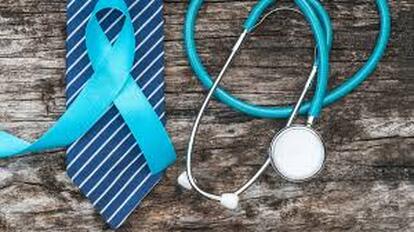 Think about the last time you were in your doctor's waiting room. Who did you see there? Chances are you probably noticed the usual suspects-- nurses, mothers, and children. However, it is likely that you did not see as many men. In healthcare settings across the country, this is an everyday reality. June marks Men's Health Awareness Month, a national campaign that raises awareness about preventable conditions and promotes health and wellness among men and boys. According to research, most doctor visits involve women and children. On average, men are only half as likely to visit doctor's offices, emergency departments (ED), and physician home visits compared to women. Men are also less likely to utilize preventive care, hospice care, and dental care visits[1]. Socialized norms about masculinity impact boys' and men's perception of their health and health behaviors. These norms also influence the beliefs of their family members, friends, and others within their social network. The limited and delayed use of healthcare services can have severe consequences for men's health and wellness. Life expectancy is nearly five years shorter on average, for men than for women, and mortality rates for most leading causes of preventable death are highest among men. These health outcomes impact men's ability to be an involved father, supportive husband, and engaged member of their families and community. "Recognizing and preventing men's health problems is not just a man's issue. Because of its impact on wives, mothers, daughters, and sisters, men's health is truly a family issue.[2]" Throughout June, religious organizations, private businesses, civic organizations, government agencies, fraternities, and others will host events to provide education on men-related health outcomes, prevention strategies, and resources. This month on, encourage men and boys to participate in regular medical checkups and early detection for disease and injury. Support men's disease prevention and wellness by:
For more information on Men's Health, check out: Men's Health Resource Center: www.MensHealthResourceCenter.com Health Profiles of Men and Boys in each state can be found at www.stateofmenshealth.com [1] Pinkhasov RM, Wong J, Kashanian J, et al. Are men shortchanged on health? Perspective on health care utilization and health risk behavior in men and women in the United States. Int J Clin Pract. 2010;64(4):475‐487. doi:10.1111/j.1742-1241.2009.02290.x [2] Congressman Bill Richardson. Dr. Malikah S. Waajid, Ph.D, MPH Dr. Waajid is an epidemiologist and program evaluator with more than 10 years of experience working in community health in the United States and abroad. She is born and raised in Decatur, Georgia.
8 Comments
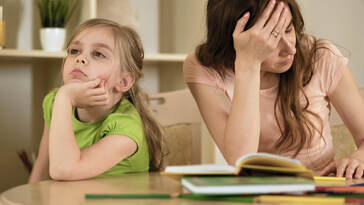 Who would ever imagine we would have gotten to this point: online learning for every student in the United States of America. As an educator for 17 years, I must say this is one of the most difficult times I’ve experienced. According to a NewsWeek article, a group of NWEA researchers came up with two possible scenarios when discussing the effect of the pandemic, “… data to project growth trajectories for the students under two scenarios: a "melt," in which students basically gained no ground during the school closures; and a "slide," in which students lost ground academically during the closures at rates similar to those seen over the long summer break.” (Sparks, 2020). This might sound discouraging to some parents; however, it also should not deter them from trying to lessen any negative effect a prolonged closing might have on their children returning to school in the fall, Inshallah (God willing). Being an educator, I expect for some of my students to have a summer slide due to a number of different reasons: traveling, lack of supervision, parents’ jobs, mental break, etc. I used to suggest various activities to parents that students can complete during their summer break:
Taking this model into account, we can plan to continue learning during the summer time to ensure that our children do not have a huge summer slide once we return in the fall. Some ideas to continue learning are:
Dr. Khaleeqa Bruce Ed DMy name is Dr. Gloria Bruce. I have been in education for 17 years, with the last five years as an Assistant Principal at Al-Falah Academy. I am a firm believer that learning is a continuous journey and I am always looking in areas I can improve my craft. 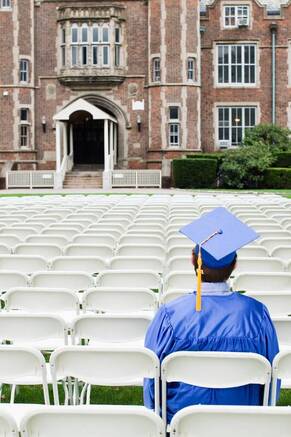 “Come on, we’re going to be late.” My mother repeated for the millionth time. We were headed to one of her friend’s son’s graduation. I didn’t think he’d mind if we were late after all, it wasn’t like we were family. But we piled into the car and headed towards the Infinite Energy Center nevertheless. Up until this point I had only seen small graduations as I had attended a small Islamic school in a shopping plaza. This graduation was being held in the same place that Demi Lovato concerts were held. So I was a little anxious about going. Once we arrived my mother’s friend handed us our tickets. It felt surreal to think one day I might have tickets to pass out, to have people cheering my success and accomplishments. We took our seats and waited for his name to be called. Name after name was called until his was said and we cheered and hollered. I doubted he could hear us but that didn’t keep us from enjoying his success too. This year I was robbed of this opportunity. COVID-19 took all my “first lasts”. There was no Senior Breakfast. No epic Senior prank wars. No Senior spirit week. No Senior skip day. No Prom. No Senior Night for those of us that played spring sports. But most of all no graduation. No final goodbye after years and years of critical thinking prompts and standardized testing. Corona Virus has forced a class of students to seize the moment. We’re never guaranteed tomorrow, so we have to make use of today. My heart hurts as I think of all the ways I could have said goodbye to my teachers, classmates, and friends. Sometimes I imagine a year where “outside” is open and everything went as planned. But we plan and our Creator plans. I may never understand the meaning of this loss, but I do know that everything happens for a reason. And the class of 2020 will forever be remembered as the ones who finished strong. Tariqah Abdul-MalikTariqah is a member of the class of 2020. She plans to major in prelaw and loves writing, reading, soccer, and basketball. 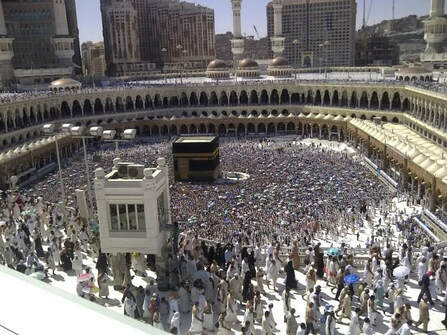 An enormous catapult propelled a young Ibrahim (AS) toward a searing fire; a towering representation of the outside world’s distaste for his devotion to the one true deity. The catapult was needed because this fire was too intense for his idol worshipping enemies to approach, though they were the ones that built it. As he hurled toward the inferno, death seemed imminent to the thrilled onlookers, and likely to Ibrahim himself. But similar to many who have faced death since him, time slowed down for the Friend of Allah (SWT). While repeating affirmations of Allah's Supremacy and Oneness, the seconds became minutes, perhaps even hours. Because Ibrahim found enough solitude and peace within himself in these fleeting moments to receive affirmation from his Creator. It came in the form of the angel Jibril, asking Ibrahim what he needed. Ibrahim replied to Jibril that he needed nothing from him. But Allah’s interjection can be found in Surah Anbiyaa, verse 69 where He conveys: “We said, ‘O fire, be cool and safe for Ibrahim!” So the peaceful solitude that Ibrahim enjoyed while being flung toward raging flames increased when he landed inside of said flames. His response was not at all like mine would have been. I would not have been able to run out of that fire and gloat to my would be murderers fast enough. Not Ibrahim. He simply said, “For me Allah suffices and He is the best disposer of affairs” and enjoyed a few more moments in the soothing flames. This literal grace under fire is what the Father of Prophets displayed time and time again, often in times of extreme isolation. This quality became a trend within his progeny, the greatest examples in the Qur'an. Prophet Yusuf (AS) experienced extreme isolation twice in his lifetime. In the well after incurring the jealousy of his brothers and in prison after invoking the lust and subsequent shame of a powerful woman. Prophet Yunus (AS) experienced it in the belly of the beast after giving up on the mission that was prescribed to him by The One Who Heals. Maryam’s entire life, a testament to chaste abstinence and worship, shows us that our Sisters can reach the heights of piety and produce greatness without the aid of anyone other than Allah. Much of her life was lived in isolation. And of course our beloved Muhammad SAW often took long walks to be alone with nature before and after he received revelation. It was during one of these excursions, inside the cave of Hira that the angel Jibril first gave him Allah’s command to “Read!” Later, during a pivotal battle in which he was wounded, Muhammad took some time to heal in the cave of Uhud. Socialization as a Crutch We live in a time where it is very easy to be a face in the crowd of Muslims, whether in person, or online. There is no shortage of scholars and Imams with the gifts of knowledge and speech. If we were to relate our experience to a prophetic one, it would that of Sulaiman, the prophet who ruled the entire world and owned a majority of its riches. He spoke many languages, including those of the birds, the jinn and even the ant. For many of us though, we are the ant in this scenario. We use the ease of socialization as a crutch, comfortably living in the shadows of great leaders, picking and choosing which beautiful coattail to ride on, accepting whatever wisdom they deem necessary for us to learn, never feeling the need to seek knowledge on our own. Never searching within. The Most Important Ramadan of Our Lives Allah has catapulted each of us toward facing our own personal jihad. For some of us, that may be the fire of rage or drug abuse. For others it may be the worship of false idols. Or prison. Or the cave of our repressed urges or memories. We may realize that we have neglected our true calling and been swallowed whole by the beast that is this world, neglecting our piety and relying on man to do for us what only we can do for ourselves with the mercy of Allah. For the first Ramadan of our lives, we cannot count on our brother to Read for us during tarawih. For the first time we cannot bury ourselves in work in order to lose track of time until after Asr prayer. For the first time, it is undeniable that Allah is giving us the time to heal from this pivotal battle that we have been fighting as Friends of Allah in hostile territory. That is why this is the most important Ramadan of our lives. May we all accept the challenge with the grace of Ibrahim and say with our hearts and actions, “For me Allah suffices and He is the best disposer of affairs.” Masood Abdul-HaqqMasood Abdul-Haqq is business strategist, speaker and writer. A graduate of the University of Central Oklahoma with a degree in Business Law, Masood also teaches Qur’an and serves as Chairman at his local masjid. Masood resides in Oklahoma City with his wife and three children. 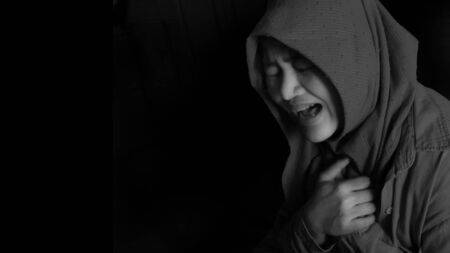 The Covid-19 Pandemic has taken the world by surprise. We are being flooded with information regarding its risks, how it can be passed on to others, and where we should and should not go. It feels as if overnight our lives are no longer in our control. That sense of powerlessness can easily increase our anxiety. Anxiety can be described in a variety of ways but it generally feels like an uncontrollable nervousness that makes it challenging to be at ease. Its side effects can be displayed not only through mood and behavior but also affect your heart rate and can have a negative impact on your health. Although we are currently in an uncertain time there are ways to manage that uneasy edge. Here are 5 ways to manage your anxiety while at home:
Maryam Miller DSNPMaryam Miller is an Atlanta native who currently resides in Decatur Ga with her husband and two children. She received her bachelors in psychology and Masters in Community Counseling. She believes in the value of hard work while recognizing the importance of setting boundaries and managing life’s stressors. 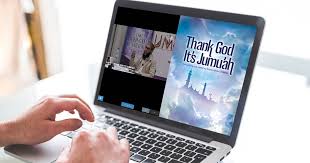 The masajid may be closed, but learning has not stopped. Many masajid in the Atlanta metro area have adjusted to the newly imposed gathering limits by holding jumuah virtually. This Friday, in the month of Ramadan, attend ju'muah from the comfort of your home. This is a blessing for those of us who were repeatedly missing ju’muah due to our work schedules. Now the whole family can enjoy the khutbah without distractions... or distracting others. Roswell Community Masjid Atlanta Masjid Islamic Center of North Fulton Masjid Omar bin Abdulaziz Masjid Al Furqan Masjid Al Muminun 1:45 Masjid Ibadur Rahman Madina Institute 2:20 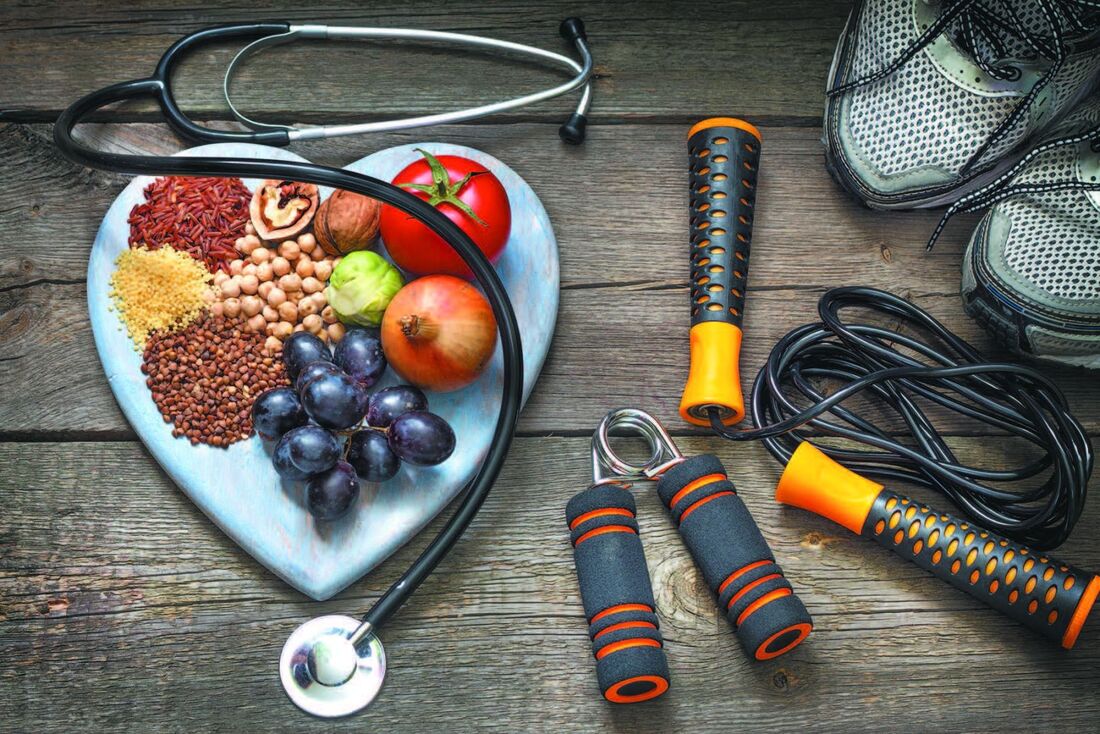 By Khadijah Roberts My intentions is to be a reminder to others as well as to myself is to put our trust in Allaah (Tawakkul) in all circumstances. Obey Allaah and follow the ways of our beloved prophet Muhammad May The Peace and Blessings Be Upon him Aameen. Alhamdulillah we have been guided and directed in all circumstances through Quran and Sunnah gifted with the salaah, duas, fasting, eating habits, how to sleep, purification etc; All forms of wellness to hold on to. Wellness is now a priority for most people as well as awareness mode; which is a good thing. Alhamdulillah! Allaah created us with a priceless body that has built-in fighting soldiers the commander and chief is the Immune System. The Immune System protects the body against disease or foreign damaging substances. Once upon a time our food was a lot more nutritious. Due to the depleting of the soil the food we eat is not the same. A healthy diet and lifestyle is so important. Supplements in this day and time is a must have. Also support your Immune System with probiotic rich foods. Probiotics support a healthy gut and gut health is directly tied to Immune System health. Did you know that 70% and 80% of the body’s immune cells are housed in the gut? Drink plenty of clean water(not contained in toxic plastic bottles). Sleep is vital! Lack of sleep can weaken your Immune System. Exercise or do some type of body movements or brisk walks is an important role. In my opinion another supplement that I don’t go without is certified pure therapeutic essential oils. At times we may have immune challenges but keep maintaining your Wellness Lifestyle. As for those who have not; this is a Wake Up Call. It’s nothing to fear but to be aware and know that we should be doing or at least striving to do most of the things mentioned regardless of any circumstances. So with awareness take action by washing your hands frequently. Be aware of not touching your face towards your mouth without sanitizing your hands. Sanitize your work and home environment. Cover your mouth when you cough and sneeze with tissue or into your upper sleeve if you don’t have tissue. Be mindful not to spread germs. I truly hope this was a benefit! Disclamer: It’s important to keep in mind my role as a health coach is only to guide and mentor. The goal in mind is to coach a positive wellness lifestyle. All information provided is intended for educational and informational purposes only and can not take the place of professional medical advice, diagnosis, or treatment from a licensed or registered practitioner. No information provided has been evaluated by the Food and Drug Administration and is not intended to diagnose, treat, cure, or prevent any disease, or to be considered medical or psychological advice. I assume no liability! Khadijah Roberts, HC A dose for the Soul: “Put Your Trust in Allaah and Throughout your day make Dua!" May Allaah grant us good health and protect us from harm Allahumma Ameen sali ala Muhammad Aameen!!! Khadijah RobertsMy name is Khadijah Roberts I’m a mother of 10 children 24 grandchildren born and raised in Cleveland, Ohio I currently reside in Stone Mountain Ga... Family Life is my life and with a large family I found ways to work from home I’ve been working from home for over 20yrs only worked outside of my home a few times in 2012 I decided to get my certification as a health coach which led me into aromatherapy as of now I have added financial skills of obtaining assets to sum up what I do is health and wealth solutions You can find out more at www.khadijahroberts.com 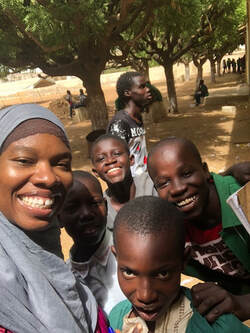 By Sakeena Abdul-Hakeem The kids call me “aunty.” What else are they expected to call a nearly 40 year old American lady who suddenly shows up in their third grade classroom? After living in Senegal, West Africa for two years, looking for educational opportunities for adults, I was dissatisfied with the options. My understanding of Wolof was too rudimentary to attend lectures by the resident scholars. And my Arabic knowledge had too many holes in its foundation to be useful. I was attending a one hour Arabic class, four days a week, but the main focus was on memorizing poetry. I struggled through basic Arabic conversation, but could parrot lines of ancient prose. I was no closer to my goal of understanding the language of the Quran than when I’d first arrived in Africa. That’s when the director of a local private school invited me to attend the El Hajj Abdullahi Niass Institute. I’d thought for sure that the local K-12 schools were for children up to age 18, just as they are in the a United States. Boy was I wrong. Have you ever thought about going back to school? What did that look like for you? Perhaps you can enroll in night classes or weekend courses at your local college. Maybe you’re looking to achieve a financial goal that earning another degree or a certificate will ensure. Not for me. I was going all the way back. Back to primary school. After an initial assessment, which I didn’t realize I was taking until half way through, I was placed in 3rd grade. I thought I was just having a polite conversation with the principal. In Arabic, he asked me my name and where I was from. He asked if I could recite a Hadith, a surah from the Quran, and if I knew the difference between verbs and nouns. He scribbled a quick note and directed my young translator to show me the 3rd grade classroom. I thought perhaps I’d peek in, greet the teacher and make arrangements to start attending class the following week. Nope! The teacher rearranged the rows of girls and squeezed me onto a narrow bench besides two of them. This was to be my first day of class. As I sat in the classroom, I noticed some major differences between our American educational system and theirs. Instead of colorful posters pasted to the walls, they were bare. All attention was focused on the huge blackboard in the front of the room. There were about 80 students to one teacher. And some of these kids didn’t look like 8 year olds- what I would consider to be a 3rd grader. In fact, a man sitting two rows over from me had a speckled beard! What could I learn in 3rd grade in Africa? I really had to humble my nearly 40 year old ego to learn from Muhammad, which I would discover was the name of almost every teacher in the entire school. We baked in the hot classrooms without so much as a fan, but no one complained. The students stood at silent attention whenever the teacher, or a visiting guest, would enter the classroom. If the teacher was in class before them, the students stood at the door of the classroom waiting for permission to enter. They ooh’d and aah’d in appreciation whenever a fellow classmates was called upon to recite a lesson from the Quran. They stood to respond whenever the teacher called on them. The girls took turns sweeping the classroom each morning while the boys cleaned the blackboard and arranged the desks properly. There was a lot more to learn here than just reading and writing. There was a wholistic approach to education. It was more so about respect, good manners, honoring knowledge and it’s teacher- developing a whole person as opposed to just the mind- which seems to be the problem with much of western education. Many of the students had completed the memorization of the entire Holy Quran before enrolling in Arabic school, hence the varied ages of the students. Although, initially it took some getting used to, I really benefited from Arabic school in Senegal. I have a greater appreciation for traditional knowledge and it’s transmission. I believe every person who has the will, should take the opportunity to enjoy learning traditional Islamic knowledge in Africa. The holes in my Arabic foundational knowledge have been filled and I can see great strides in my understanding of Quran. If this is your goal, you too can achieve it, no matter what age. It just takes going back to the basics. All the way back. Sakeena Abdul-HakeemSakeena Abdul-Hakeem is an entrepreneur, sign language interpreter, mother, and published author. For more of her work, check out her blog SakeenainSenegal.wordpress.com and find her novels and short stories on Wattpad. 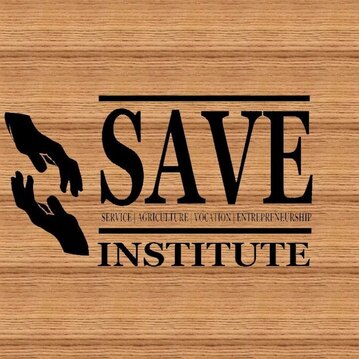 By Atiba Jones Only 59% of black males graduate public high school in this nation And only 17% go on to earn Bachelor’s Degrees, is the reality of the situation And even blacks with degrees, statistically earn far less than their uneducated white counterparts throughout their career’s duration So it’s no wonder why African-Americans are far more likely to end up on probation And consistently have the highest percentages in prison AKA the new plantation Yes, we’ve come a long way, but I believe there’s still need for a lot more salvation What happens to the other 41% of black males who didn’t complete high school? What happens to the other 83% without a Bachelors to use as a tool? Are they to just be forgotten about as if the problem is merely minuscule? Our educational system has failed them, and no, it’s not cool It’s time for an alternative system that goes beyond the surface It’s time to interrupt their cycles of poverty, crime, incarceration and lack of purpose It’s time for our youth to be exposed to agriculture, vocational trades, entrepreneurship and humanitarian service The art of service has been used for centuries as a tool for character development and spiritual training It instills humility, gratitude and decreases complaining It rids one of arrogance & hypocrisy and leaves nothing but purity remaining It focuses one on benefiting others rather than seeking that which is merely entertaining And the beauty of agriculture is that it reconnects us with nature and our natural state It helps us to understand where the food comes from that ends up on our plate It helps us to experience, through our hands, what God can Create And it allows us to feed our communities healthy foods from what we collectively cultivate Over the past few decades, from high schools we’ve seen vocational education gradually disappear “You have to go to college” is all that we’ve begun to hear And perceptions of inferiority from not having a degree has become a real fear While many tradesman earn far more than the average college graduate per year So why is it made to seem as if the only options are either college or the street? With the only exception being the possibility of becoming a professional athlete Or maybe you can make it by learning how to rap some destructive lyrics to a beat Presenting these as the only options is blatant deceit There is absolutely nothing wrong with going to college, however, it’s not the only way to economically compete And if you don’t have a degree, there’s no need to feel as if you’re somehow incomplete And besides this, entrepreneurs are consistently the wealthiest people on Earth And they create situations for children to inherit enterprises at birth Beyond money, entrepreneurship helps one to discover their true worth It shows you that you can build and lead You can create jobs for those in need But the key is to not fall into the trap of arrogance or greed Because the objective is to save ourselves so that we can save our families and others So that we can uplift our sisters and inspire our brothers Provide hope and support for all the single mothers So this is not just about some economic or material pursuit It’s about radically changing the trajectory of the poor and destitute Providing a new career path for the dope boy and the prostitute Snatching up misguided youth from out of the streets and showing them that there’s a different route And this, my brothers and sisters, has sparked the coming of SAVE Institute Atiba JonesAtiba Jones is the director of the SAVE Institute and former founding director of the Risala Institute. He has been a community activist in the Atlanta area for over 15 years.  The number of COVID-19 cases continues to rise dramatically within the U.S., indicating that the disease is more contagious and spreads more quickly than the seasonal flu. Although anyone can become infected, high-risk groups such as the elderly and those with chronic medical conditions are more greatly impacted. With an estimated 10% to 20% of cases experiencing severe symptoms, hospitals and healthcare staff run the risk of becoming overburdened and not able to provide adequate care for those who need it most. Add to this scenario the fact that the novel coronavirus appears to have a considerably higher mortality rate than the seasonal flu and that there is no vaccine or proven treatment at this point, then it becomes imperative that preventive measures are utilized to slow down its spread. The burden of doing this falls not only on the shoulders of the government and public health professionals, but on the general population as well. The good news is that the average person can help to significantly curb the spread of this disease by proactively engaging in social distancing. Social distancing may be the word of the moment, yet its meaning and actual implementation might still be vague for some people. Put simply, it is the public health practice of maintaining a physical distance between people in order to prevent the transmission of disease. On a personal level, it involves staying at home as much as possible and avoiding crowds and large gatherings. In the case of COVID-19, an infected person can remain asymptomatic for up to 2 weeks, potentially exposing countless others to infection. However, if this same person has been practicing social distancing, then this can significantly lower those opportunities for passing on the virus. Certain lifestyle adjustments should be made in order to practice social distancing at this time. Those who can work from home should do so and shopping trips to get essentials should be strategic so that they are limited in frequency and duration. If one does encounter another person, say during a weekly grocery run, then experts recommend keeping a safe distance of 6 ft. from each other. For those whose jobs are considered essential and cannot work from home, effort can still be made on a personal level to keep a safe distance from others in any environment. In addition, frequent and thorough handwashing should be coupled with social distancing for maximum benefit. All of this is done regardless of infection status, in order to reduce the opportunities for exposure. Those who do become exposed to COVID-19, for example through contact with an infected individual or recent travel, will have to quarantine themselves using stricter isolation measures. Social distancing is a public health practice that involves the community making some behavioral changes and sacrificing in order to curb the spread of disease. In the case of the COVID-19 pandemic, it is the primary tool available to protect ourselves from this dangerous virus right now. And at a time when the situation may seem overwhelming, it gives people the power to make a difference for themselves, their loved ones, and the greater community. Rizwana Khan MSPHI have a Masters of Science in Public Health with a focus in Epidemiology. I worked as a Statistician and Data Analyst for several years at the CDC and other research institutions. Currently I am a math teacher at a private high school. |
Don't miss another edition of A Message from Makkah. Click the button below to join our mailing list
Contact Us for Advertising Opportunities!
Archives
January 2023
Categories
All
Our Sponsors |
Makkah International Institute
 RSS Feed
RSS Feed